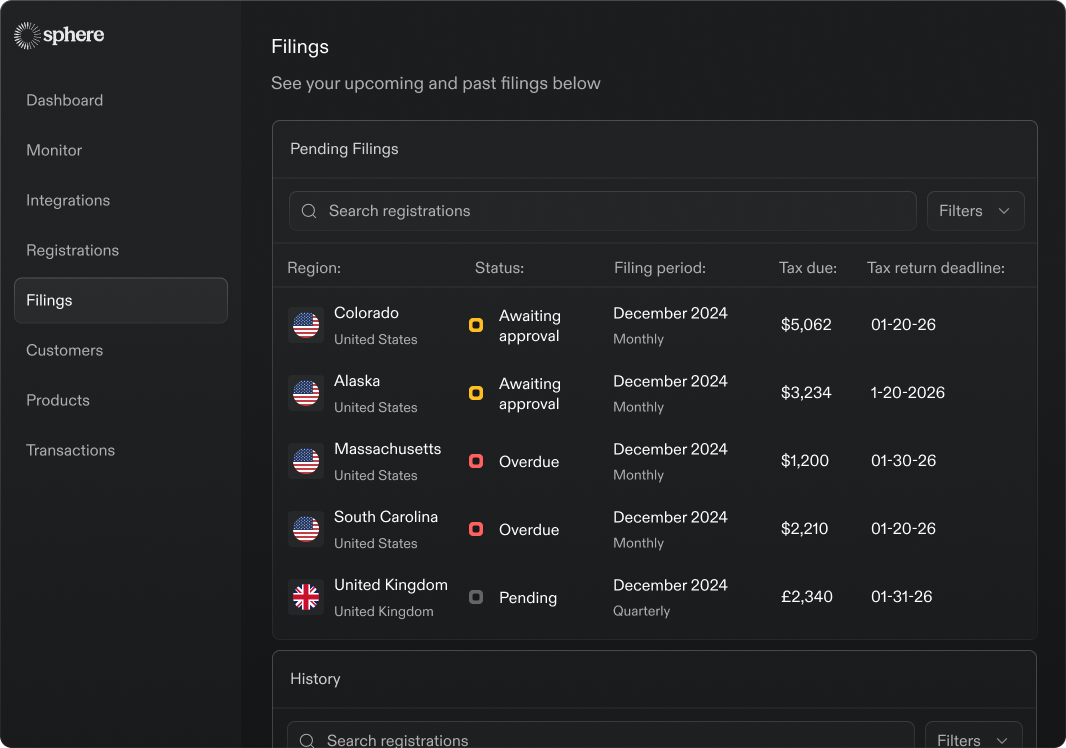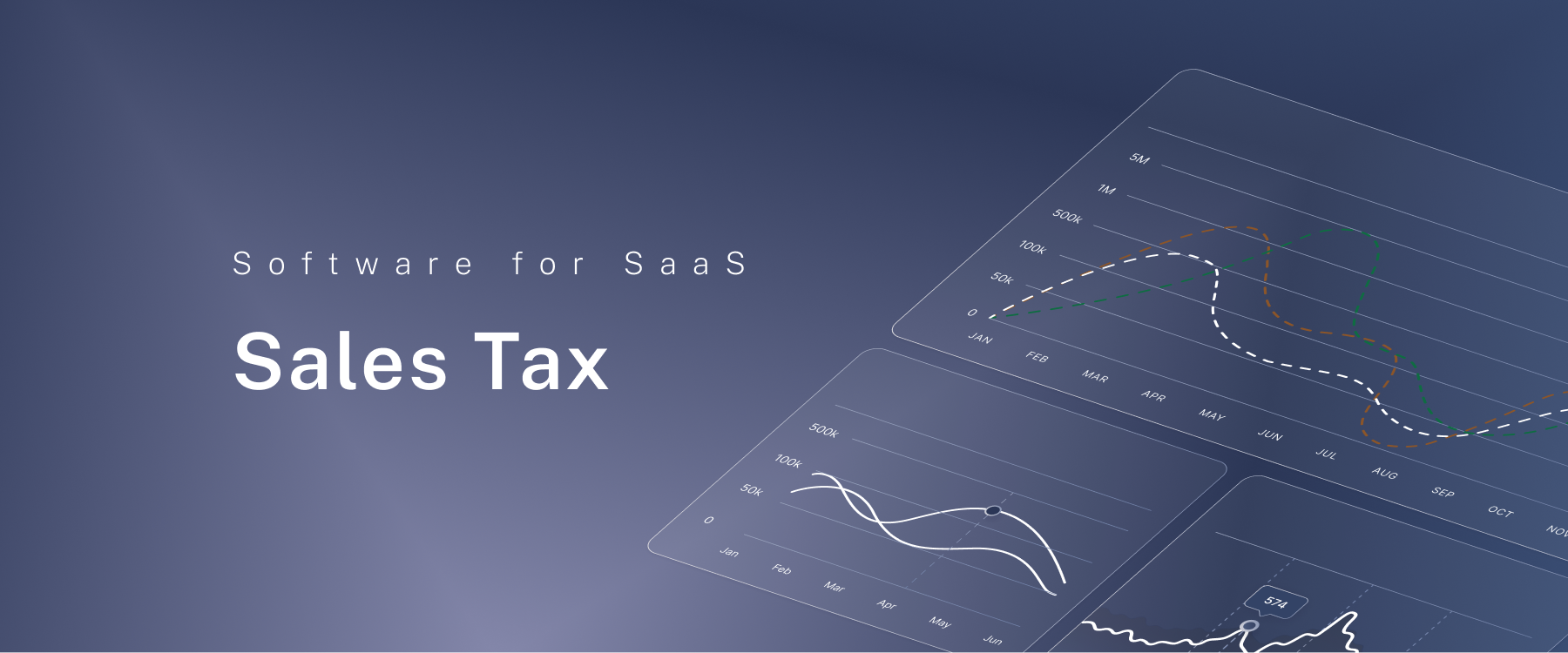.png)
As you build your business and start selling beyond your home country’s borders, tax should be a key consideration. If you’re US-based, you’re likely used to charging sales and use tax. But if selling into the EU, the value added tax (VAT) applies. Or if selling to Australia, then you likely need to determine how to collect their goods and services tax (GST).
Tax requirements vary dramatically by region and product category. What's taxable at 20% in one country might be completely exempt in another. The rules determining whether you need to collect these taxes depend primarily on three factors: whether you are required to comply, your customer's location, and whether you're selling to a business or a consumer .
When it comes to indirect tax requirements, it’s vital to understand where your business is selling and when you are required to comply.
What's the Difference Between Sales Tax, VAT, and GST?
Below is a quick explanation of the types of indirect taxes your business will run into as you expand across borders. Keep in mind that some countries don’t follow these tax systems, and that all countries have country or region-specific requirements. I.e., you can’t charge US sales tax to a customer in the UK.
Sales Tax (US-specific)
US sales tax is a consumption tax that takes place at the point of sale to the final consumer. States and the local areas within (counties, cities, special taxing districts, etc.) set a percentage sales tax rate and a retailer collects that tax from their customer. The retailer then remits that tax back to the state and local areas periodically for them to use it on budget items like schools and roads. Sales tax is charged at the rate where the purchase is delivered or consumed. In online sales, that generally means the buyer’s address.
US sales tax differs from the rest of the globe in that it is governed at the individual state level, meaning that only sellers with sales tax nexus in a state are required to collect in that state. Further, sales tax is only charged at the final point of sale.
VAT & GST (Used Globally)
VAT and GST serve the same basic function as sales tax–allowing governments to collect taxes on commerce–but operate differently. Unlike sales tax, VAT is collected by sellers at every stage of a transaction.
For example, a raw materials supplier charges VAT to a manufacturer for a load of unfinished goods. The manufacturer creates a product with those goods and sells it to a distributor. That distributor then marks up the price and charges VAT to a retailer. Finally, the retailer further marks up the price and charges VAT to the final buyer.
Businesses in this supply chain can also claim credit for the VAT they pay, effectively making it a true tax on the “value added” at each stage. More than 175 countries worldwide have a VAT. VAT can be complex due to different rates on different types of sales, or even who the customer is.
GST is similar to VAT in that it is charged at every stage of the supply chain and that businesses can claim tax credits on GST paid. However, it is often considered simpler than VAT because it is a single flat rate on every transaction rather than varying rates as with VAT. Countries like Australia, New Zealand, Canada, and India use GST systems.
When Reverse Charge Applies
The “reverse charge mechanism” is critical for B2B international businesses to understand and implement.
Under this system, when selling to a business customer in another country, you may not need to collect VAT or GST. Instead, the responsibility for accounting for the tax shifts to your customer. The customer "self-assesses" the tax, reporting both the input tax (what they would have paid to you) and the output tax (what they can claim back) on their own tax return.
This mechanism significantly reduces the compliance burden for international sellers, as you may not need to register for VAT/GST in countries where you only have B2B customers.
However, to apply the reverse charge correctly, you must:
- Collect and verify your customer's tax ID (VAT/GST number)
- Include specific language on your invoice, noting the reverse charge
- Maintain proper documentation of the verification process
When You Do Need to Charge VAT or GST Internationally
B2C Sales – You Usually Charge Tax
Sales to consumers are generally taxable, no matter in what country or under what tax system. That said, countries often set a sales threshold that your business needs to meet within the country before you are liable for the tax. So occasional sales of a tangible product to a consumer in a country may not require that you comply with their tax regime.
Digital sales, though, can differ. For example, the EU requires non-EU businesses to register for VAT from the first sale of digital services to EU consumers.
On the other hand, Australia requires GST registration once sales exceed AUD 75,000 annually no matter if you sell tangible products, like toothbrushes, or digital ones, like e-books or SaaS products.
B2B Sales – Use Reverse Charge (with valid tax ID)
For B2B sales, the reverse charge mechanism can often be applied, but only if you properly collect and verify your customer's tax ID. This generally requires:
- Collecting the VAT/GST ID during the sales process
- Validating that the ID is legitimate (using official validation services)
- Including specific language on your invoice stating that the reverse charge applies
- Maintaining proper documentation for audit purposes (for ~5 years, though requirements vary by jurisdiction)
If a business customer cannot provide a valid tax ID, you must treat the sale as B2C and charge the appropriate tax.
Threshold Types That Trigger Registration
Every country sets their own indirect tax rules and laws, including who has to comply and when. As you begin navigating the world of international indirect compliance you’ll notice these trends:
- No threshold - Businesses are required to register and collect tax upon making their first sale.
- Economic threshold - Revenue based. Businesses are required to register once they hit a certain amount. Note that there may be exceptions, such as non-taxable (or zero-rated) sales excluded from the threshold amount. Similar to “economic nexus” in the US.
- Physical presence - A location, employee, inventory (more common in e-commerce), or some other physical presence in a country often triggers sales tax compliance, even for non-residents.
- Web-based visitor thresholds (Uncommon) - Some governments, like Indonesia, track web visits and trigger a request to register based on traffic. This is uncommon.
Key Rules by Region
These rules apply to businesses who are not located in a country/region selling into that region.
Note that if you sell on an online sales platform, like Amazon or eBay, then that platform may be responsible for collecting and remitting the tax. Also note that in some cases, high value shipments are considered imports and may be taxed at the border rather than at the point of sale.
EU (VAT)
The EU has a VAT system where each country sets their own rates. These range from the lowest, Luxembourg, at 17% to the highest, Hungary, at 27%.
- B2C digital service sales - Register for VAT from your first sale
- B2C physical product sales - Seller is required to collect VAT
- B2B sales - Can apply reverse charge with valid VAT ID
Fortunately, the EU's One-Stop Shop (OSS) allows businesses to register once with just one EU Member state and file a single return for all EU countries, rather than registering separately in each country.
UK (VAT)
UK VAT is similar to EU VAT, though they separated in 2021 due to the “Brexit.” The UK’s VAT rate is 20%.
- B2C digital services sales - Register for UK VAT from your first sale
- B2C physical product sales - Seller is required to collect VAT
- B2B sales - Can apply reverse charge with valid VAT ID
Canada (GST/Harmonized Sales Tax (HST))
Canada has a GST of 5% at the national level with additional varying taxes by province. Note that individual provinces can also impose taxes, much like the individual states in the United States, and these require a separate registration and filing. Additionally, Quebec has its own harmonized tax rate that followed a different set of rules.
- B2C digital services sales - Register for GST from your first sale
- B2C physical product sales - Seller is required to collect GST after exceeding a sales threshold of 30,000 CAD over four calendar quarters
- B2B sales - Can apply reverse charge with valid GST registration
<div class="disclaimer"> Note that some very large online sellers may also be subject to a Digital Services Tax (DST).</div>
Australia (GST)
Australia has a flat GST rate of 10%.
- B2C digital services AND physical product sales - Sellers are required to register when they know their business turnover (income, excluding certain sales) will meet Australia’s 75,000 AUD sales threshold
- B2B sales - Can apply reverse charge with valid GST registration
How to Set Up Tax Collection with Stripe
.png)
Stripe’s robust payment processor allows you to specify whether your customer is subject to the reverse charge mechanism. As a native tax calculation partner within Stripe, Sphere calculates global tax on your behalf.
Here’s how to make your Stripe account compliant with Sphere:
Enable Sphere Tax in Stripe
- Log in to your Stripe Dashboard
- Navigate to "Settings" > "Tax"
- Enable Sphere Tax and complete the registration process
- Configure your products and services with the correct tax categories
<div class="disclaimer"> Note: You can also enable Stripe Tax in this step.</div>
Collect Customer Tax IDs
To implement reverse charge for B2B sales:
- In Stripe, enable the tax ID collection field
- Configure validation settings - this will let Stripe know to request tax IDs from your customers
- Store collected IDs securely
- From here you can set your customer’s tax status to “reverse charge.”
According to Stripe’s documentation, they will automatically apply the reverse charge based on the presence of a collected tax ID and the jurisdictions involved in the transaction.
Add Reverse Charge Notes to Invoices
Stripe will automatically add the text “Reverse Charge” to invoices where the reverse charge mechanism was applied. You can customize this message if you wish to add more information.
Export Tax Reports for Filing
You can export all of your tax reports on your Stripe Registrations page.
- Click “Export transactions”
- Specify the date range (including time zone)
- Choose whether you need an itemized or summarized report (for tax filing purposes you likely need an itemized report)
- Click “Export” and wait for the action to process
What About Physical Products?
Physical products have much more complex tax considerations than digital goods. Different countries have different minimum thresholds (or no thresholds at all), but when you exceed those, you are generally required to register and collect tax from all buyers in the country or region.
On some transactions, such as those more than £135 in the UK or more than 1,000 AUD, import taxes will apply.
For physical e-commerce businesses, storing inventory in a country typically also creates an indirect tax obligation in a country as if your business is resident there.
Stay Compliant with Sphere
Selling cross-border is full of tax pitfalls. Sphere is a modern, AI-powered tax compliance solution that takes the mystery out of complex concepts like VAT thresholds and the reverse charge mechanism.
Comprehensive Global Coverage
Unlike legacy solutions that rely on third-party partners for international coverage, Sphere provides truly global tax support for international sales with direct integration to taxing authorities worldwide. This unified approach eliminates the challenges of trying to make separate US and international solutions work together.
Automated Compliance Features
Sphere simplifies tax compliance with:
- Automated tax code assignment - The AI engine analyzes your products and automatically suggests the correct tax codes across jurisdictions.
- AI-powered tax determinations - Sphere’s Tax Review and Assessment Model (TRAM) monitors global tax laws to ensure correct tax calculations on all transactions. No need to consult expensive international tax experts.
- Real-time nexus monitoring - Continuously tracks sales thresholds to alert you when tax obligations are triggered in new locations.
- Smart tax registration and filing agents - AI agents prepare, validate, and submit tax registrations and filings across different tax authorities.
- Reverse charge mechanism applied automatically - Scratching your head over when you need to apply the reverse charge mechanism? Sphere does the heavy lifting for you from now on.
- Robust integrations - Sphere works seamlessly with top billing and accounting tools like Chargebee and is a native tax collection engine within Stripe.
- Fast onboarding - Legacy global sales tax offerings take weeks to get up and running. Sphere takes minutes.
- No pricing surprises - Pay a simple, flat rate of $100 per month per jurisdiction. That’s it.
Sphere is the modern solution to cross-border tax compliance, offering comprehensive automation that saves you time, reduces errors, and lets you focus on growing your business instead of worrying about complex tax rules.








.png)

.png)






